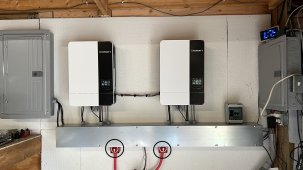KalebTheMaker
New Member
Hi all,
I'm slowly putting my system together and have gotten to the point where I am installing batteries and making all of the cables. The other day I had called the company who sold me all of my equipment and he told me that he "mis-spec'd" the battery switches, which are the 48v Blue Sea switches that I see in just about every install I have seen online.
What he told me is that they have a *maximum* rating of 48v, which of course in my 48v system charging voltages can get to the 55-56v range. He called Blue Sea and spoke to them and they said to absolutely NOT use them on a 48 volt system. They are rated at 48v for 36v systems and under.
But, I see quite a few of these switches being used on 48v systems on the internet. I know I shouldn't trust any youtube video that I see, that is why I am posting here.
What are your thoughts on this? If this is true, I'm not sure what switch I should use. My dealer wasn't sure either, he suggested some big 250A breakers that were like $111.00. These specifically.
Thanks,
-KalebTheMaker
I'm slowly putting my system together and have gotten to the point where I am installing batteries and making all of the cables. The other day I had called the company who sold me all of my equipment and he told me that he "mis-spec'd" the battery switches, which are the 48v Blue Sea switches that I see in just about every install I have seen online.
What he told me is that they have a *maximum* rating of 48v, which of course in my 48v system charging voltages can get to the 55-56v range. He called Blue Sea and spoke to them and they said to absolutely NOT use them on a 48 volt system. They are rated at 48v for 36v systems and under.
But, I see quite a few of these switches being used on 48v systems on the internet. I know I shouldn't trust any youtube video that I see, that is why I am posting here.
What are your thoughts on this? If this is true, I'm not sure what switch I should use. My dealer wasn't sure either, he suggested some big 250A breakers that were like $111.00. These specifically.
Thanks,
-KalebTheMaker




